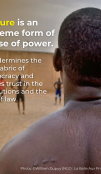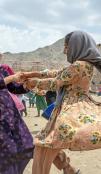Women Making the World Safe from Biological and Toxin Weapons

The Biological Weapons Convention (BWC), the first multilateral treaty to outlaw an entire category of weapons of mass destruction, celebrates its 50th anniversary. Together with the Permanent Missions to the UN of Australia, Panama, the Philippines, and Sweden, as well as UNIDIR, we organised an exhibition to highlight the indispensable role of women in building the BWC. On 28 November, representatives of the organisers officially opened the exhibition at the Palais des Nations in Geneva.
“Gender equality is not only a matter of percentages, it is a matter of decision and policy. It is not an option, it is the right. A duty we must carry forward. The EU remains fully committed to integrate a gender perspective and ensuring women's participation and leadership in all peace and security-related contexts, disarmament and non-proliferation instruments, such as in BWC. We will continue to implement a stronger and more gender-transformative foreign and security policy – and to support gender equality and women and girls’ empowerment around the world.”
Ambassador Lotte Knudsen, EU Delegation to the UN – Geneva
The women showcased in the exhibition became role models for the future generations of diplomats, scientists, academics, and experts aspiring to work in the field of bioweapons, showing that a career in this specific and highly technical sector is both imaginable and achievable.
“As we embark on the 9th Review Conference of this important treaty, I can’t think of a more appropriate way to get things started than to acknowledge the role that so many talented women have played in the work of the BWC – in its negotiation, its implementation, and in the science underpinning it.”
Amanda Gorely, Ambassador and Permanent Representative to the United Nations and to the Conference on Disarmament, Geneva
“As we look back to the past fifty years of the BWC, it is important to acknowledge that women have always been at the forefront of efforts to reject biological weapons and promote the peaceful uses of the life science, that they continue to be very much a part of the ecosystem that sustains this Convention, and that they also play an important role in advancing the aims of the BWC into future.”
Ambassador Maria Teresa T. Almojuela, Permanent Representative of the Republic of the Philippines to the Conference on Disarmament
Since 1972, 184 States Parties and 4 Signatory States committed to the Convention, which prohibits the development, production, acquisition, transfer, stockpiling, and use of biological and toxin weapons. This remarkable result would not have been achieved without the devotion and commitment of some pioneer women that, at the First Review Conference, held in 1980, represented just 7% of the delegates. They paved the path for the next generation of female diplomats and scientists, who despite this gap and the gender disproportion, had the courage to “bring their chair to the table.”
This exhibit not only showcases the indispensable role of women in building the BWC but also tells the multifaceted story of how gender equality is, and always will be, work in progress - and intergenerational. The combination of profound commitment with professional insight by some of the pioneer women that we encounter today in this exhibition, has engaged, and empowered a younger generation woman with knowledge and information to build a safer world. Moving from words to action, their input will inspire future generations to come, to continue pulling in the same direction for peaceful uses of biology.
Anna Jardfelt, Ambassador - Permanent Mission of Sweden in Geneva
“UNIDIR is pleased to co-sponsor this photo exhibit, which is an important step to change the history of women’s underrepresentation in BWC-related initiatives. Efforts towards greater inclusivity offer an opportunity to craft a new future for disarmament – one that takes into account everyone’s needs in order to deliver the best results.”
UNIDIR Director Robin Geiss
The exhibition features women who participated in the drafting and negotiation of the BWC, women who are at the forefront of keeping the world safe and secure from bioweapons, while advancing the peaceful uses of biology, and promising young women who are pursuing careers in the life sciences.
The electronic version of the exhibition is here:





